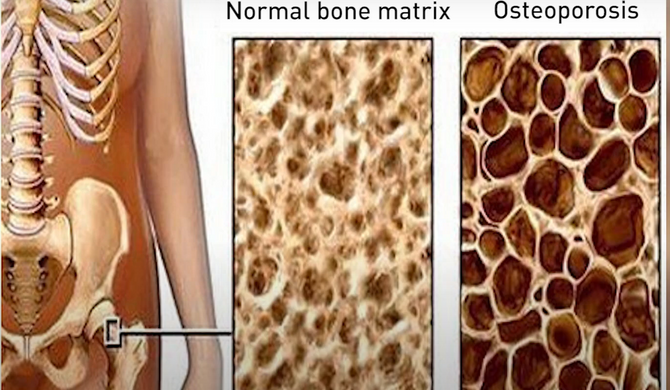Are You at Risk for Osteoporosis?
20 March 2023
Osteoporosis is a condition that weakens and makes bones brittle. Although anyone can develop osteoporosis, it is more common in women over 50. There’s a study found that 77% of Malaysian women who have osteoporosis after menopause don't even know they have it.
Dr. Chua Hwa Sen, an orthopedic and joint reconstruction specialist at Sunway Medical Centre, has completed 100 successful robot-assisted joint replacements in Malaysia. In this article, he explains everything you need to know about osteoporosis risk factors, how to maintain bone health, and provides a self-assessment checklist for assessing your own osteoporosis risk.
What Is Osteoporosis?

Let’s take a look at this photo. The bone matrix on the left side looks normal and can withstand pressure under a microscope.
However, if you have osteoporosis, your bones may look like the photo on the right, with low bone density and appearing very porous and empty.
This can make it more difficult to withstand pressure, and even a small force can easily cause a fracture. So, it's important to take care of your bones and maintain bone density to keep them healthy and strong.
Why Are Older Individuals More Prone to Osteoporosis?
Osteoporosis is typically a condition that affects the elderly. Your bone mass increases from childhood until around the ages of 25 to 30. If you do not use your bones frequently, your bone density will gradually decrease.
It is a well-known fact that women tend to lose bone mass at a faster rate, especially during menopause when female hormones are greatly reduced. This can lead to the development of osteoporosis, a condition in which bones become fragile and more likely to break. This issue is not limited to women, as many elderly individuals are also affected by osteoporosis.
As previously mentioned, a lack of exercise can contribute to the onset of osteoporosis. Engaging in regular physical activity is an effective way to help build and maintain strong bones. Without exercise, bones may become weaker and more prone to fractures, leading to more severe osteoporosis problems in the long run.
Who Else Needs to Be Concerned?
Osteoporosis is a condition that affects both men and women, but women are more frequently diagnosed with the disease. This is because women tend to have lower bone mass and density than men, and they experience a greater loss of bone mass as they age. Hormonal changes that occur during menopause can contribute to bone loss.
Regarding pregnancy, it is true that the developing fetus requires a lot of calcium from the mother's body for growth. If the mother does not get enough calcium from her diet, her body will take calcium from her bones, which can increase her risk of developing osteoporosis later in life.
Another factor that can increase a woman's risk of developing osteoporosis is early menopause or surgical removal of the ovaries and uterus. This is because these events can cause a sudden drop in oestrogen levels. Oestrogen is a hormone that plays a role in keeping bones strong and healthy. Without sufficient oestrogen, bones can become weaker and become more prone to fractures.
Ways to Maintain Bone Health
To ensure healthy bone growth, it is important to provide our body with the proper nutrients. One way to do this is by consuming foods rich in calcium and vitamin D. In addition to a healthy diet, exposure to sunlight can also aid in the process of bone growth.
But proper nutrition is not the only factor in maintaining healthy bones. It is important to note that our bones become stronger with higher levels of physical activity and exercise. By staying active, we can signal our bodies to stimulate the cells responsible for building bones.
This is why it is important to engage in activities that require us to use our bones, such as walking, running, or weight-bearing exercises.
Here is a self-assessment checklist to see if you are at risk for osteoporosis:
- Have your parents ever had hip fractures due to minor collisions or falls?
- Have you ever injured your bones due to minor collisions or falls?
- Have you taken hormone drugs often such as cortisone or prednisone for more than three consecutive months?
- Has your height decreased by 3 cm?
- Do you often drink excessively?
- Do you smoke more than 20 cigarettes a day?
- Do you often suffer from dysentery and diarrhoea?
- Did you experience menopause before the age of 45 (for women only)?
- Did your menstruation stop for more than 12 consecutive months, except during pregnancy (for women only)?
- Do you have symptoms of erectile dysfunction or lack of sexual desire (for men only)?
If you answered "yes" to any of the questions above, it doesn't necessarily mean that you have osteoporosis.
However, it could indicate that you are at a higher risk of developing the condition. To determine whether you’re at risk of osteoporosis, you should get a DEXA bone density test, a high-precision X-ray that measures your bone mineral density and bone loss.
DEXA has been recognised as the best way to diagnose or assess your risk of osteoporosis. To learn more or schedule an appointment, reach out to us at: https://www.sunwaymedical.com/en/bone-mineral-density-scan
Back





